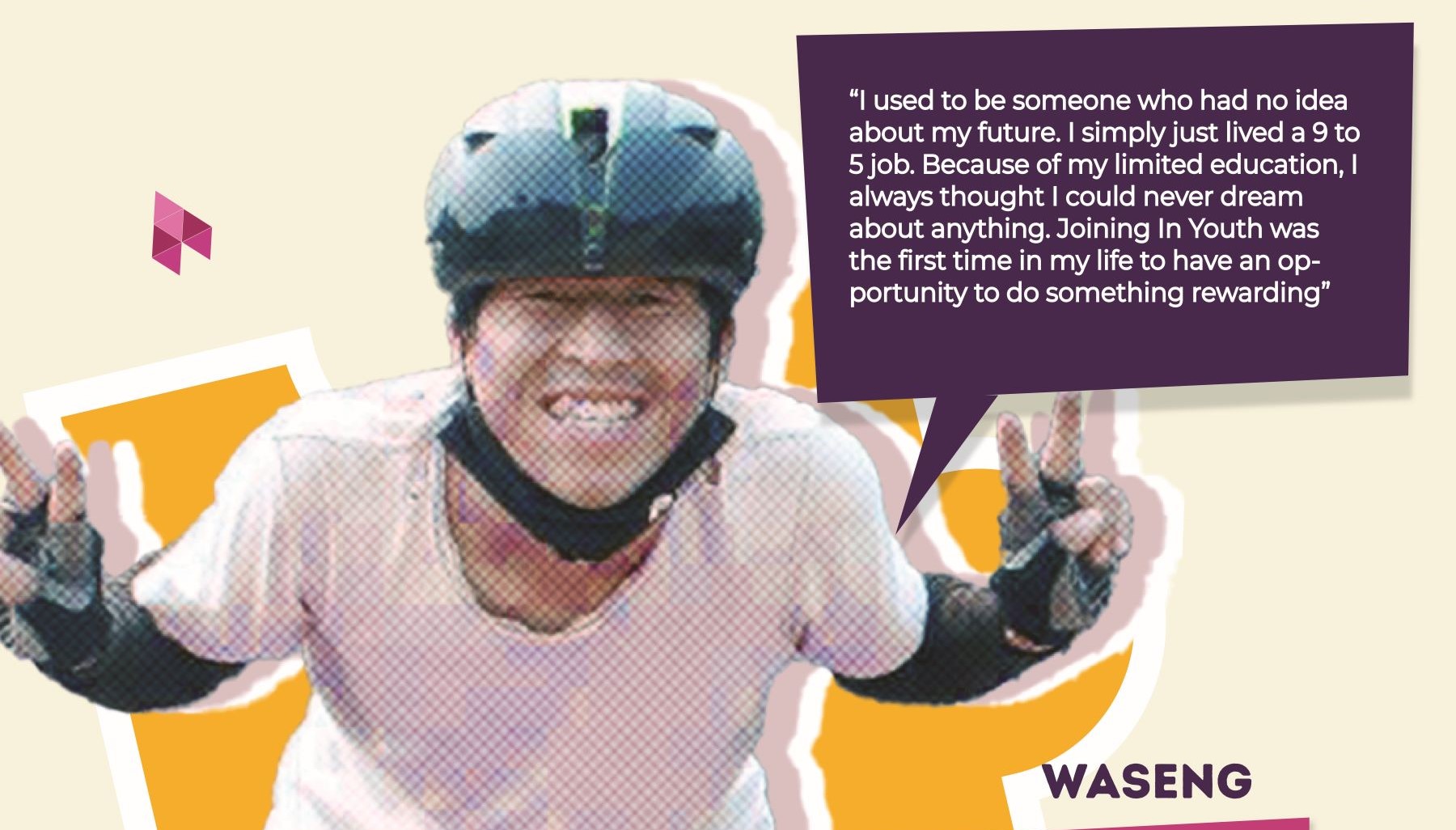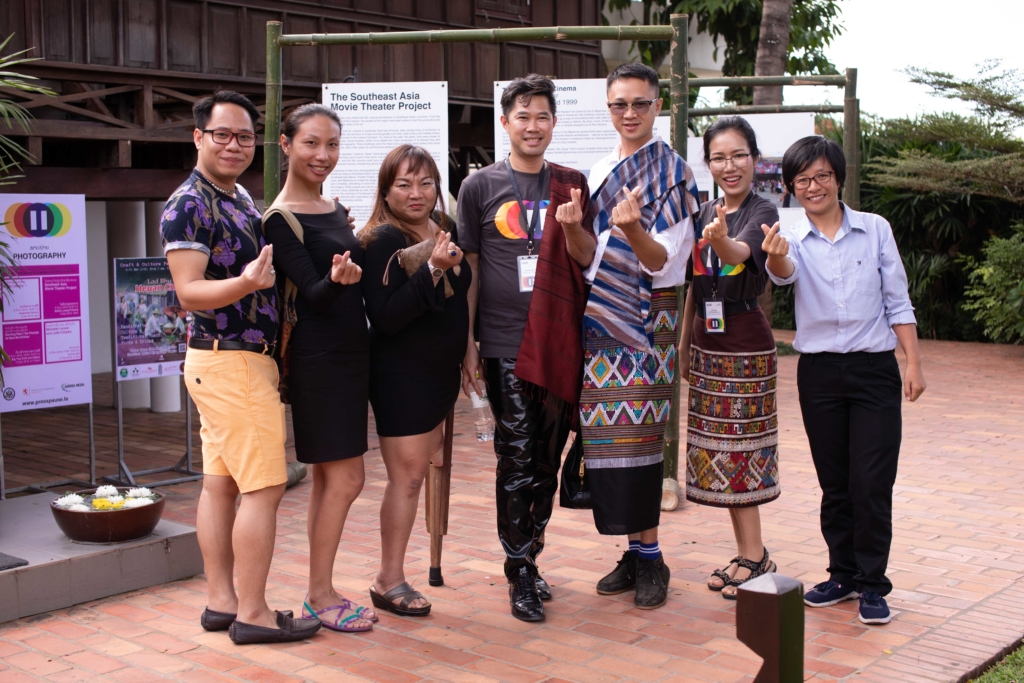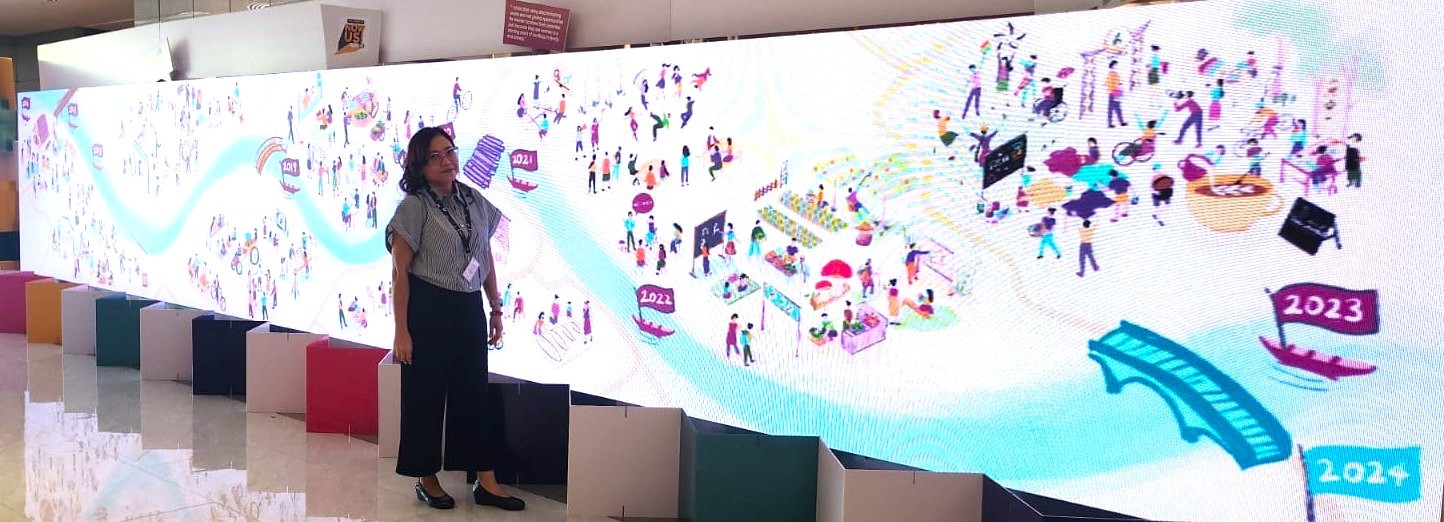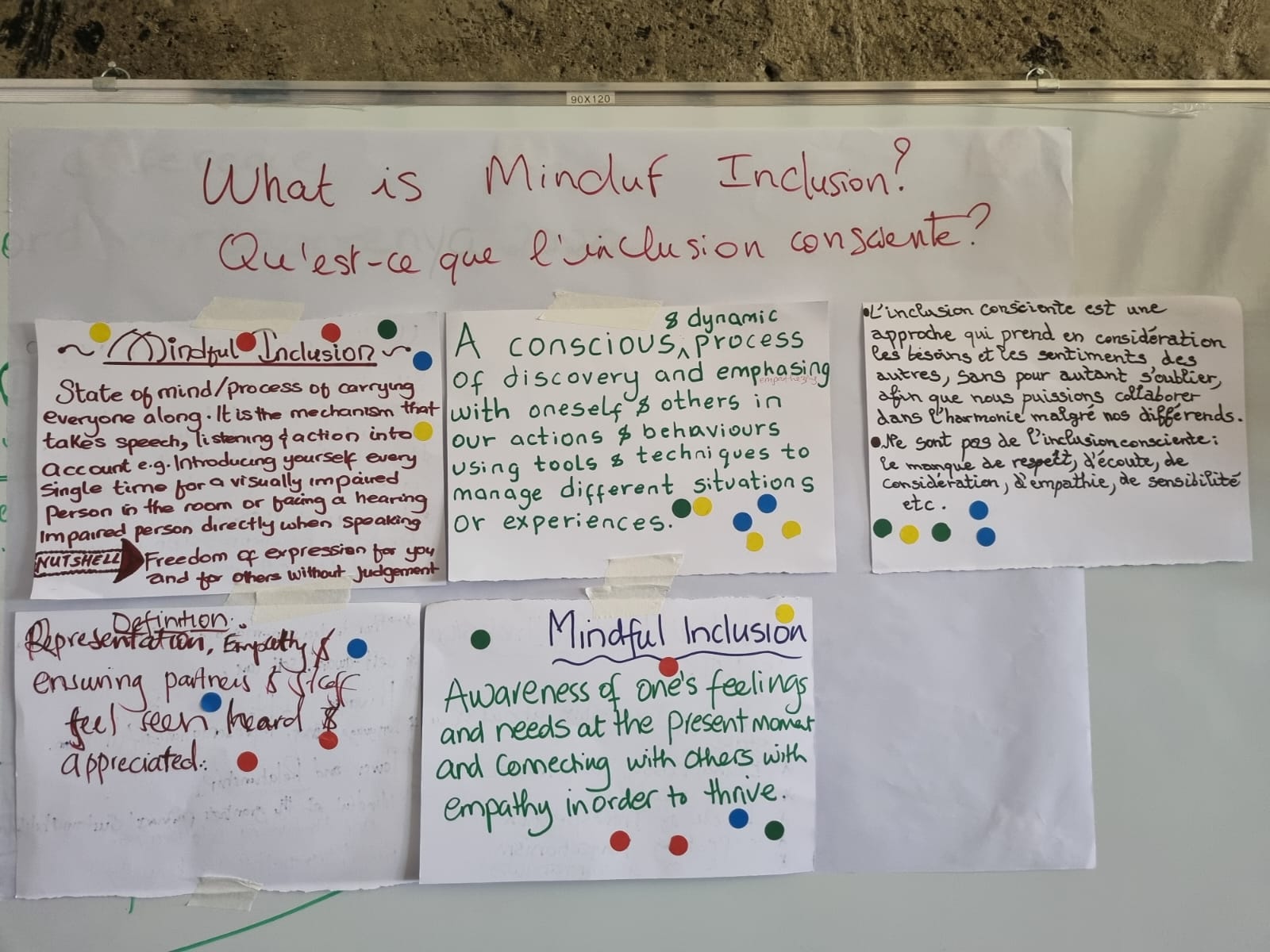Change begins from within, the first step to a more inclusive society.
By Bounyali Souvankham, Voice Laos Linking Learning Amplification Officer
The LGBTQI+ community in many of the countries where Voice is present ranges from acceptance without legal recognition to widespread stigma and persecution. While same-sex marriage is not currently legal in Laos, LGBTQI+ acceptance has gradually grown over the past decades.
Recognizing the rights of LGBTQI+ people means acknowledging the dangers of violence, discrimination, and the plethora of negative consequences that come with exclusion and unfair treatment. In Voice programmes, There are two emerging trends among the LGBTI grantees:
- The use of creative forms of expression to influence communities, and
- To mobilize and organize groups in order to get official recognition as part of civil society.
During the pride month, the Voice team in Laos commemorated the IDAHOTB 2022 with the theme “Our Bodies, Our Lives, Our Rights”. The aim was to broaden the learning beyond existing grantee-partner networks and to influence a larger community, we hosted a panel discussion conversation in which panellists came from different professions of private and government sectors. The event registration was open to the public, so audiences of all ages and genders participated based on their interest in the topic and desire to effect change. We believed that doing so would engage with many more LGBTQI+ advocates and discover different points of view.
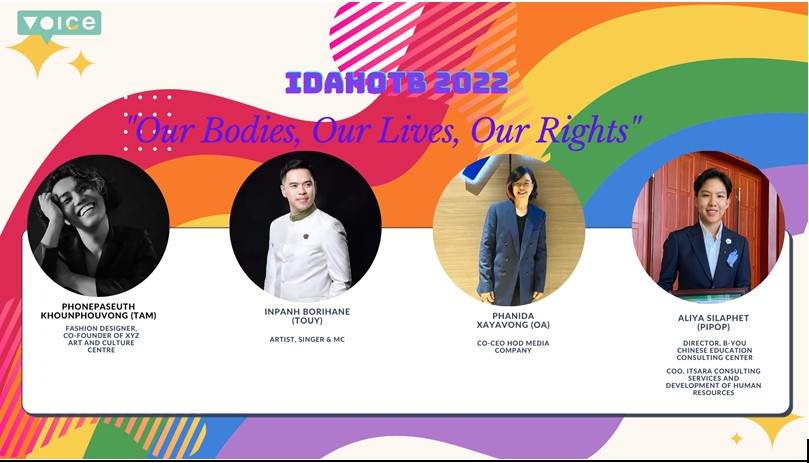
The panellists had a diverse range of life experiences that foreshadow the larger mainstream. The discussion was fascinating because it brought together a wide range of emotions and personalities while providing a complete picture of the Lao LGBTQI+ community. To feel psychologically safe enough to express their true selves without falsifying them in order to fit in, the panel discussion concluded that changes must begin within oneself, and everyone must participate in the inclusive social betterment.
Discovering self-concept begins in a positive environment
“When my mother introduces me to other people, they would ask if I am the “son” because I dress and act differently than other boys. My mother always responds proudly, ‘Yes, son and daughter in one, and expresses her gratitude for having given birth to such a wonderful child.” Tam Khounphovong, a well-known Laos fashion designer, reflected on his childhood while thanking his mother for her perseverance and for allowing Tum to live his life freely. Tam’s mother has been his most ardent supporter, assuring him that he will be raised in a secure environment and that he will grow up to be a truly amazing individual.
Tam spent years trying to figure out who he was. He experimented with fashion from a young age, wearing skirts, applying makeup, participating in traditional Lao dancing, and a variety of activities ranging from knitting to yoga to boxing and football. His awareness grew as he realized what activities brought him joy and began to do them more frequently while doing less of what went against his nature.
“I live my life with all my rights; this is my body, and I decide what to wear and pursue a career path of my choosing, not because of what others say or do. When I asked my family if they were embarrassed by my fashion choices, my mother replied, “if it does not harm others and is appropriate and respectable for the occasion and place, sure one can wear anything.”
The story also revealed that high levels of LGBTQI+ acceptance can dispel physical and mental health issues, discrimination in employment, and underrepresentation in positions of civic leadership. Tam was fortunate to have been raised and surrounded by a positive environment, which led to his confidence, and self-determination to become a current success as a designer.
First to understand, then to be understood.
Pipop Aliya, a successful young LGBTQI+, on the other hand, once struggled to communicate with her own parents about her sexual orientation and gender identity’s biological origin. This topic had been discussed under duress due to expectations of culture and societal norms.
Pipop was an excellent student in school, an obedient child at home, served as student president while studying abroad, as well as ran a successful business during her university years. When it came to love and relationships, she did not refuse to talk to men; in fact, she did everything that society considers to be a successful individual.
Beneath the smile she wore, she didn’t feel fulfilled or happy.
Pipop has reached a point where she believes she requires immediate communication with her parents in order to thrive. “I can only raise your body but not your heart, so it’s your life, you are the one living on it” her father responded, which brought her tears and was remembered as a life statement.
Meanwhile, Pipop’s mother objected to her actions and many life decisions. Pipop’s life outside the family was a cause of worry, as how Pipop will be accepted by society, how she will deal with her new identity, and how she would care for herself as she grows older without marrying (binary marriage). But after a series of squabbles, Pipop realized that all of the disagreements were caused solely by parental protection, not the mother’s suppression of her right to be happy.
A great lesson learnt that before presenting one’s own viewpoint, one must first strive to comprehend the other person’s. Pipop recognized her mother’s anxiety and behaved appropriately on points to alleviate it. It took some time, yet her mother was relieved to see that Pipop could be a leader in her own right, that she could care for herself and serve others.
“We live in a diverse culture with diverse thoughts and opinions, therefore I learned to give before taking, which is to understand others before being understood by others. And this leads to inclusiveness – it is how I live my bodies, my life, and my rights.” Pipop.
Generalization and Stereotype
“A lot of time, people over-generalize and stereotype about LQBTQI+ community,” said OA Phanida, Media company CEO. OA came from Luang Prabang, a historic city, one of Laos’ most culturally conservative located in the northern part of Laos.
OA describes herself as having a masculine outlook and lifestyle. She recalls being teased by friends about how she dresses and was mocked for communicating with her stepfather in a foreign language. She humiliated, disowned, and beaten up by her own mother and siblings for hanging around with too many female friend conseHer mental health was impacted greatly by trying to be true to the lifestyle she wanted.
OA states that an individual is a reflection of his or her uniqueness, not of their nationality, race, community, or family. Though, the surroundings did not quite conspire her to demonstrate gender identity. OA went on to say that many times she is visibly uncomfortable but shows to be entirely at ease.
When technology and social media were not utilised to promote other cultures and languages in the 1990s. Particularly when the association between language and society is well rooted, for OA who imitate a masculine lifestyle, speaking a foreign language was contradictory to societal norms. The setting of such an exhibition created misunderstanding and bias in the cultural context.
For the most part, OA noted that the LGBTQI+ community was subjected to societal generalization as a result of a lack of efforts to learn about the complexity of human life as well as varied situations and outcomes. According to OA, “even people in my family, my sister and I, can be so different. How can it be considered that the rest of the females in Luang Prabang are like what you’d imagine? Indeed, people must be true to themselves and refrain from making broad generalizations. “
While positive generalisation gives the impression that Lao females speak Lao in a soft tone of voice and that their vocations are nothing more than embroidery and needlework, this is not the case. Negative generalization, on the other hand, leads to stereotypes, such as all females with masculine features are lesbians and vice versa, or that females working in crafts or technical sectors are not considered authentic Lao women.
The overgeneralisation of a group of people and the assumption of overwhelming similarities are to be diminished, it is time for the Lao people to break free from the old judgment and embrace the fact that individuals have the right to be themselves as long as it does no harm to others. “Stereotyping does not make anyone a bad person, but taking the chance to educate and become more conscious is always a positive thing — especially when the LGBTQ community is already a minority and could use all the help and support they can receive,” added OA.

